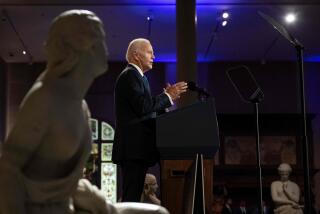PERSPECTIVE ON U.S.-RUSSIAN TIES : Bring the Armies in From the Cold : Russia needs a security arrangement with the U.S., as befits two nuclear powers facing a world of new dangers.
The failure of the former Soviet republics to agree last month to a unified defense arrangement means that Russia has emerged as the only military player of global note from the former Soviet Union. This ends the waiting game over the military future of the faltering Commonwealth of Independent States. It also clears the way for Washington to begin forging a serious security dialogue with Moscow.
With the Cold War over and communism dead, Russia’s leaders have undergone a sea change in their conception of friends and enemies. An early symbol was Moscow’s refusal to aid Iraq during last year’s Persian Gulf war. More and more, Russian security planners have recognized that it makes more sense to work with the United States than against it.
Partly this reflects Moscow’s need for outside economic and technical help. More fundamentally, it indicates a desire to participate in normal relations with the West. President Boris N. Yeltsin has gone so far as to petition NATO for Russia’s eventual inclusion as a member. He has also offered his country to the United States “not as a mere partner but an ally.”
It is too early to be talking about a formal alliance between the United States and Russia. For one thing, alliances are formed to deal with common external threats. America and Russia confront none, at least today, that would counsel such a move.
Beyond that, consideration of a Russian-American alliance might needlessly agitate America’s existing allies, to say nothing of the former Soviet republics, whose leaders would wonder whether the two giants were conspiring to join ranks at their expense. Also, democracy has not taken sufficient root in Russia to justify such a gamble.
The time has definitely come, however, to start bringing Russia into a more structured security relationship with the United States, and one with clear provisions for mutually beneficial military and technical cooperation. What such a relationship might encompass in detail will obviously require careful thought. However, there is is a precedent in America’s successful effort through the Marshall Plan to bring defeated Nazi Germany into the Atlantic community as a trusted security partner after World War II.
Most suggestions about how to “help Russia” along these lines have centered on economic and technical aid, with little thought given to political or strategic context. A case in point was the announcement by Secretary of State James A. Baker III of plans to fund a science center in Siberia, whereby Washington might provide Russian nuclear experts with compensation to dissuade them from pursuing inducements from the likes of Libyan leader Moammar Kadafi. However praiseworthy in principle, such gestures fall short of offering Russia any real sense of security integration with the United States.
A key goal of such integration would be to assure Russia’s defense professionals that they are not isolated in the world. By giving them a sense of policy involvement with the United States, we might help them see their future as tied to the success of democratization in Russia and thereby disincline them from domestic tendencies toward a resurgence of authoritarian rule.
President Bush laid the groundwork for such a relationship in his statement at Camp David on Feb. 1 that we no longer consider Russia our adversary. Yet the bureaucracy has been slow to abandon the entrenched habits of a bygone era. Consider, for example, recent reports that high-level members of the Bush team have quietly moved to oppose American purchases of Russian aerospace goods out of a desire to ensure that the now gravely weakened former Soviet military-industrial complex will never re-emerge as a serious threat.
No less retrograde are lingering routines of the sort that produced the recent accidental collision between an American and a Commonwealth nuclear submarine just outside the Russian naval port of Murmansk. It is one thing to continue prudent monitoring of the former Soviet Union’s military and naval activities. It is something very different to persist in assertive operations bordering on provocations when we are trying at other levels to show Moscow an open and extended hand. There may have been a case for such hedging before the final collapse of communism. Today, the promise of a better East-West relationship makes it not just anachronistic but harmful.
Washington and Moscow stand at the threshold of ending their long and costly arms competition and have an opportunity to work together, rather than at loggerheads, in controlling dangerous tendencies such as nuclear proliferation and aggression by Third World pariah states. This momentous prospect is also a passing advantage that can easily be squandered by continued American temporizing over initiatives to help preserve Russia’s fledgling democracy.
More to Read
Sign up for Essential California
The most important California stories and recommendations in your inbox every morning.
You may occasionally receive promotional content from the Los Angeles Times.










